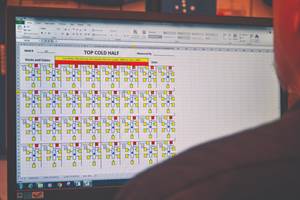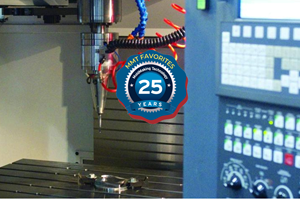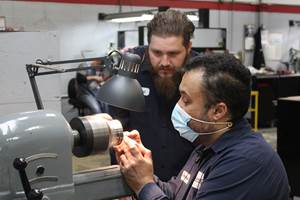Highlights from Day 2 at The MFG Meeting
Hundreds of manufacturing leaders spent the second day of The MFG Meeting in numerous educational sessions Thursday, March 7 at the Hilton Waikoloa Village in Waikoloa, Hawaii. The joining of AMT (The Association For Manufacturing Technology), NTMA (National Tooling & Machining Association) and PMA (Precision Metalforming Association) for The MFG Meeting links the entire manufacturing chain, from OEM's to distribution to end-user manufacturers, and provides the forum for uniquely collaborative conversations on the most relevant topics affecting manufacturing today.
Hundreds of manufacturing leaders spent the second day of The MFG Meeting in numerous educational sessions Thursday, March 7 at the Hilton Waikoloa Village in Waikoloa, Hawaii. The joining of AMT (The Association For Manufacturing Technology), NTMA (National Tooling & Machining Association) and PMA (Precision Metalforming Association) for The MFG Meeting links the entire manufacturing chain, from OEM's to distribution to end-user manufacturers, and provides the forum for uniquely collaborative conversations on the most relevant topics affecting manufacturing today.
General Assembly Session Three
Trends, Technology and Taking the Lead
Scott Klososky, Principle at Future Point of View
Klososky told The MFG Meeting participants that technology is a tool that can make companies win and if technology is only viewed as an operational asset instead of a strategic weapon it’s a losing proposition.
He’s not suggesting that every business owner or leader be a tactical expert, but rather be committed to learning and a certain level of risk taking. As for risk-taking, Klososky believes in leading edge versus bleeding edge – stay ahead with some risk, but don’t get behind the pack!
As a key take-away he told participants that mobile does not mean just a phone today, but that it is an outboard brain. The lesson: get on the mobile bandwagon.
He suggests building an adaptive culture where technology flourishes to achieve the key “two year lead,” become more profitable, have a happier team and achieve long-term sustainability. So, in the next five years Klososky says tap the mind hive (crowd sourcing for accelerated innovation), use data and be ready to go from mobile to wearables and, YES, implantables. In short, accept technology or starve.
Precision Machining Breakout Session Highlights
What topics are on the minds of job shop owners and managers of metalworking companies?
Attendees of this breakout session discussed seven concerns, which were all related to either maintaining profit margins in the face of rising costs or acting on opportunities.
How to handle persistent mandates from aerospace contractors for price reductions is an a example of one of the urgent profitability issues. Effective strategies shared at the session included some options such as firm, disciplined resistance (just say NO) and negotiated give-backs such as commitments to contract extensions or prepayment of material costs.
Additive manufacturing is an example of an emerging opportunity that attendees raised for discussion. The general advice was to take this technology seriously, but recognize that it is still in its infancy. Overall, the strong consensus arising from this session is that this is a good time to invest boldly in new manufacturing technology.
Best Practices: Pioneer Award Recipients
At The MFG Meeting breakout session on Best Practices: Pioneer Award Recipients, Dave Sansone, director of the PMA Educational Foundation (PMAEF), introduced three of the nine recipients of the PMAEF’s Pioneer Awards. With support from the Hitachi Foundation, the awards recognize excellence in workforce development.
The first Pioneer Award winner to present was Erick Ajax, vice president and co-owner of E.J. Ajax and Sons, Fridley, MN. A crowd of about 25 attendees at the session heard Erick describe his company’s stellar safety record (more than 21 years without a lost-time accident), and how training and commitment made it happen. “Our non-punitive near-miss reporting and investigating program is key,” he says. “If we can’t be safe, we can’t be productive; our skilled metalforming professionals can safely create the same value as 20 Chinese workers.”
Next up was Virgil DeLay, president of Diemasters Manufacturing, Elk Grove Village, IL, who described his company’s productivity system. The system, founded on knowledge and training, is detailed in a nearly 200-page training manual and handbook. “We feel that all workers need to strive toward growing their skill sets and knowledge base,” he says.
Then the group heard from Dan McGregor, from McGregor Metalworking Companies, Springfield, OH. The firm earned its Pioneer Award based on its Pay for Skills program, which compensates hourly employees based solely on their skills, without regard to length of service. Dan introduced attendees to a new initiative at the company–a paid-internship program for high school students. Students can work at the company for 6 weeks, 20 hr./week, and gain practical experience in several facets of manufacturing.
International Business Strategies
Lou Longo, Plante & Moran Global Services Partners
In this highly engaging session focusing on helping AMT, PMA and NTMA members develop international business strategies, Longo shared insights gained over many years of consulting in manufacturing technology. He told session participants that they must be internationally aware and suggests that they think on a regional scale, not country by country. By resisting the urge to enter a
market simply because a company is asked to do so, a systematic regional approach will lead to international success.
For general information, visit the website at TheMFGMeeting.com
Related Content
What is Scientific Maintenance? Part 2
Part two of this three-part series explains specific data that toolrooms must collect, analyze and use to truly advance to a scientific maintenance culture where you can measure real data and drive decisions.
Read MoreMMT Chats: Eliminating the Noise to Stay Focused on the Customer
Metro Mold & Design joins me to discuss the value of the 80/20 rule as a business strategy, its talented cross-functional team, the role of automation in mold building and molding, and the continuing impact of COVID-19.
Read MoreMachine Hammer Peening Automates Mold Polishing
A polishing automation solution eliminates hand work, accelerates milling operations and controls surface geometries.
Read MoreQuestions and Considerations Before Sending Your Mold Out for Service
Communication is essential for proper polishing, hot runner manifold cleaning, mold repair, laser engraving and laser welding services.
Read MoreRead Next
Reasons to Use Fiber Lasers for Mold Cleaning
Fiber lasers offer a simplicity, speed, control and portability, minimizing mold cleaning risks.
Read MoreAre You a Moldmaker Considering 3D Printing? Consider the 3D Printing Workshop at NPE2024
Presentations will cover 3D printing for mold tooling, material innovation, product development, bridge production and full-scale, high-volume additive manufacturing.
Read MoreHow to Use Continuing Education to Remain Competitive in Moldmaking
Continued training helps moldmakers make tooling decisions and properly use the latest cutting tool to efficiently machine high-quality molds.
Read More
















